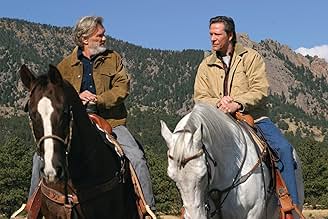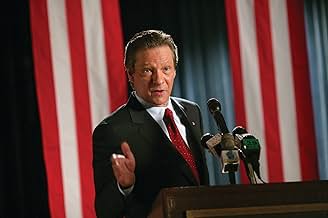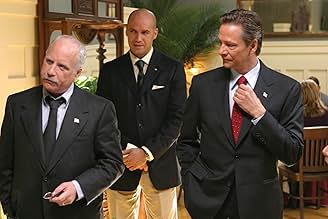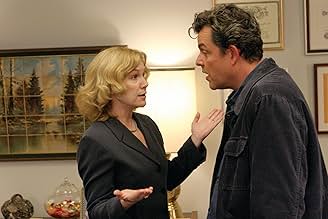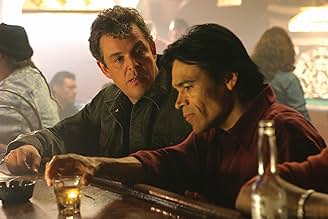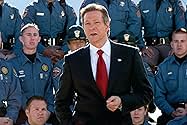CALIFICACIÓN DE IMDb
6.0/10
4.3 k
TU CALIFICACIÓN
Agrega una trama en tu idiomaThe discovery of a corpse threatens to unravel a bumbling local politician's campaign for governor of Colorado.The discovery of a corpse threatens to unravel a bumbling local politician's campaign for governor of Colorado.The discovery of a corpse threatens to unravel a bumbling local politician's campaign for governor of Colorado.
- Dirección
- Guionista
- Elenco
- Premios
- 1 premio ganado y 1 nominación en total
- Dirección
- Guionista
- Todo el elenco y el equipo
- Producción, taquilla y más en IMDbPro
Opiniones destacadas
What film depicts corrupt politicians and businessmen controlling a vast local resource but enduring a sometimes-hapless yet attractive detective investigating a murder involving those community leaders? If you said 'Chinatown,' you'd be correct; if you said 'Silver City,' you'd also be correct. There are other similarities such as both have stars with last names Huston, and justice is long coming. Beyond that, there is no qualitative similarity: Roman Polanski's 'Chinatown' is a classic; John Sayles' 'Silver City' is a contemporary curiosity.
'Contemporary' because the liberal Sayles writes and directs about a political campaign for the governorship of Colorado that barely disguises its protagonists as George Bush (Chris Cooper) and Karl Rove (Richard Dreyfuss) knockoffs. Cooper's candidate has halting, incomplete, and scripted sentences, undoubtedly the speech patterns of Bush. The manipulative and effective machinations of Dreyfuss's operative are patently those of the infamous Bush campaign mastermind.
The story and dialogue are undistinguished, as if they count on the audience to be mesmerized by the broad parallels to the 2004 campaign. (See 'Primary Colors' for wit and grit about the Clinton campaign, starring John Travolta.) Although Danny Huston (son of John and brother of Angelica) is a lesser Jack Nicholson, his easy-going persona works well for a detective who constantly gets himself into trouble rather than his clients out of it.
The comparison to Michael Moore's documentary 'Fahrenheit 911' is inevitable. The heavy-handedness of 'Silver' makes Moore's work look almost subtle, yet Sayles must be praised for his dissenting voice in parlous times for free speech. Sayles is more successful in weaving the intricate patterns of corruption in 'City of Hope'; here he seems more like Moore in an overt attempt to topple a sitting president. Sayles's 'Lone Star' is more believable, and that's about incest.
John, Viscount Morley in 'Rousseau' wrote, 'Those who would treat politics and morality apart will never understand the one or the other.'
These filmmakers understand both in varying degrees of success.
'Contemporary' because the liberal Sayles writes and directs about a political campaign for the governorship of Colorado that barely disguises its protagonists as George Bush (Chris Cooper) and Karl Rove (Richard Dreyfuss) knockoffs. Cooper's candidate has halting, incomplete, and scripted sentences, undoubtedly the speech patterns of Bush. The manipulative and effective machinations of Dreyfuss's operative are patently those of the infamous Bush campaign mastermind.
The story and dialogue are undistinguished, as if they count on the audience to be mesmerized by the broad parallels to the 2004 campaign. (See 'Primary Colors' for wit and grit about the Clinton campaign, starring John Travolta.) Although Danny Huston (son of John and brother of Angelica) is a lesser Jack Nicholson, his easy-going persona works well for a detective who constantly gets himself into trouble rather than his clients out of it.
The comparison to Michael Moore's documentary 'Fahrenheit 911' is inevitable. The heavy-handedness of 'Silver' makes Moore's work look almost subtle, yet Sayles must be praised for his dissenting voice in parlous times for free speech. Sayles is more successful in weaving the intricate patterns of corruption in 'City of Hope'; here he seems more like Moore in an overt attempt to topple a sitting president. Sayles's 'Lone Star' is more believable, and that's about incest.
John, Viscount Morley in 'Rousseau' wrote, 'Those who would treat politics and morality apart will never understand the one or the other.'
These filmmakers understand both in varying degrees of success.
While not at the level of the best Sayles movies (Lone Star, The Secret of Roan Inish, etc.), Silver City is still entertaining. The film suffers a bit from trying to do too much, and not quite making it all the way to any of its targets. But there's still a lot to enjoy.
My first thought while watching this movie was: hey, Chris Cooper isn't the star! Since his face is featured on the poster, and he starred in Lone Star, and is generally considered an A List actor these days, this was a bit of a surprise. The lead actor turned out to be Danny Huston, half-brother of Angelica, son of John, grandson of Walter, etc. Huston's character, Danny O'Brien, is hired by the Pilager campaign to intimidate a few enemies of Dickie Pilager (Cooper) after a dead body shows up in a lake during a campaign photo op. But O'Brien is by nature anti-establishment, and instincts from his previous life as an investigative journalist kick in, so he starts to investigate much more than he was hired to.
The supporting cast is terrific, though many of them (Tim Roth and Thora Birch come to mind) are wasted in tiny roles. Aside from Huston and Cooper, the only actors given much to work with are Maria Bello as his ex-girlfriend, who also happens to be a political reporter, Richard Dreyfuss as the Rove-like campaign manager, and Sal Lopez as a Mexican chef that O'Brien gets involved in investigating the background of the victim. Daryl Hannah has a nice small role as Maddy Pilager, the candidate's sister.
The general problem the movie has is that it seems a bit indecisive as to whether it's about immigration or about politics. It seems to be a bit more about immigration than politics, and other films such as Redford's "The Candidate" have covered the latter ground with considerably more energy and insight. Some reviewers have noted a parallel to the Huston masterpiece "Chinatown" - but that's a high standard to aim for, and Silver City really doesn't come close. The script is far too disjointed, and Danny Huston is just not close to Nicholson's level as an actor. Still, the movie is enjoyable, especially for its insights into the migrant worker community, which is usually ignored by most Americans.
My first thought while watching this movie was: hey, Chris Cooper isn't the star! Since his face is featured on the poster, and he starred in Lone Star, and is generally considered an A List actor these days, this was a bit of a surprise. The lead actor turned out to be Danny Huston, half-brother of Angelica, son of John, grandson of Walter, etc. Huston's character, Danny O'Brien, is hired by the Pilager campaign to intimidate a few enemies of Dickie Pilager (Cooper) after a dead body shows up in a lake during a campaign photo op. But O'Brien is by nature anti-establishment, and instincts from his previous life as an investigative journalist kick in, so he starts to investigate much more than he was hired to.
The supporting cast is terrific, though many of them (Tim Roth and Thora Birch come to mind) are wasted in tiny roles. Aside from Huston and Cooper, the only actors given much to work with are Maria Bello as his ex-girlfriend, who also happens to be a political reporter, Richard Dreyfuss as the Rove-like campaign manager, and Sal Lopez as a Mexican chef that O'Brien gets involved in investigating the background of the victim. Daryl Hannah has a nice small role as Maddy Pilager, the candidate's sister.
The general problem the movie has is that it seems a bit indecisive as to whether it's about immigration or about politics. It seems to be a bit more about immigration than politics, and other films such as Redford's "The Candidate" have covered the latter ground with considerably more energy and insight. Some reviewers have noted a parallel to the Huston masterpiece "Chinatown" - but that's a high standard to aim for, and Silver City really doesn't come close. The script is far too disjointed, and Danny Huston is just not close to Nicholson's level as an actor. Still, the movie is enjoyable, especially for its insights into the migrant worker community, which is usually ignored by most Americans.
Limp satire misses almost every mark. The target appears to be Bush, but none of Bush's real weaknesses are underscored with any satiric edge - speeches by Bush himself are funnier than those delivered by Candidate Pillager. In fact the script can't decide whether it's a real satire or a dramatic comment on political problems faced by illegal aliens. At any rate, the pacing of the comic moments is pretty bad - there's no oomph here, no energy. The acting also lacks energy - it is clear the actors aren't sure what Sayles wants from them - a matter made worse by the fact that every character is embarrassingly miscast.
This film is a shocking disappointment for admirers of Sayles' previous exceptionally fine work. What the heck went wrong here? And now I see Sayles is slated to do a "Juraissic Park" sequel? Obviously something's gone bad for this man's career - I hope he can pull it back together. But not with a film this incomplete.
This film is a shocking disappointment for admirers of Sayles' previous exceptionally fine work. What the heck went wrong here? And now I see Sayles is slated to do a "Juraissic Park" sequel? Obviously something's gone bad for this man's career - I hope he can pull it back together. But not with a film this incomplete.
Dickie Pilager is running for governor of Colorado. He's a good-looking frat boy with a dubious past that includes at least one drunken-driving charge. But he comes from a politically influential family and his daddy's a powerful U.S. senator. Dickie, however, lacks panache. He can't put together a simple sentence without stumbling. He's terrible when he's unscripted, cannot function without a teleprompter, doesn't have a clue what he's talking about, reduces policies to simple catch-phrases, but the wealthy contribute generously to his campaign and he's awfully "user-friendly" to big business. As one character in "Silver City" points out, Dickie sounds gubernatorial on TV when the sound's muted. Sound familiar?
In "Silver City," writer/editor/director John Sayles rolls a "Chinatown"-esque murder mystery, cynical political commentary and pointed observations about contemporary media into one film that succeeds more often than not. There are moments when I got the impression Sayles was trying too hard to drive home his point about Dickie's incompetence. As fun as it might have been to mock Dickie, he's too easy a target. The greasy players around Dickie - for instance, his handler Chuck Raven (played with smarmy charm by Richard Dreyfuss) - are far more interesting. Where "Silver City" crackles is in its distrust of our political system, the influence of slimy corporate types on candidates and ineptitude of the media.
Despite this being one of Sayles' weaker films, he remains one of the finest filmmakers this nation has produced in the last 25 years. His filmography contains some of the best independent films in recent memory - "Return of the Secaucus 7" (1980), "Lianna" (1983), "Matewan" (1987), "Eight Men Out" (1988), "Passion Fish" (1992), his masterpiece, "Lone Star" (1996) and "Men With Guns" (2000). Even much of his lesser-known works, "City of Hope" (1991), "The Secret of Roan Inish" (1994) and "Limbo" (1999), are remarkable pieces of storytelling. He's also socially conscious, acutely aware of the importance of shedding light on social problems, be they the plight of immigrants, childless couples or corruptibility of politicians.
What's ultimately a bit disappointing about "Silver City" is not so much its multi-layered story, but Sayles' inability to keep it tightly wound. As much as I admire Sayles, another editor with a fresh set of eyes might have helped tremendously.
He's deftly handled multi-story plots before, but this film doesn't seem keenly focused. Sayles weaves too many threads that don't patch together all that well. He relies a bit too much on coincidence - especially using two migrant workers in a pivotal plot point - to unravel his mystery and many interesting subplots and characters remain dangling, most glaringly a subplot involving reporter Nora (an under-used Mario Bello) and her fiancé Chandler (Billy Zane), a self-proclaimed "champion of the underdog" - he's a big-business and tobacco lobbyist.
The actors, many of them Sayles regulars, are terrific, as usual. Chris Cooper plays Dickie with great aplomb, but Sayles surprisingly wastes other talented actors in throwaway roles. Tim Roth, Thora Birch and Daryl Hannah have little to do in roles that scream for more importance. Hannah gets some of the best dialogue, but her Maddy Pilager needed more screen time.
Sayles' Jake Gittes is reporter-turned-investigator Danny O'Brien, who's more akin to Elliot Gould's Marlowe than Bogart's. Danny Huston plays O'Brien with tremendous charm, but Huston lacks the magnetism of his sister, father or grandfather. David Strathairn might have worked better. Another Sayles regular, Joe Morton, would have been a fascinating choice.
Sayles' cynicism about our wimpy media and political process is well founded. We're, after all, living in an age when the media ignored the real story behind the Florida debacle in the 2000 election (the disenfranchisement of hundreds, if not thousands, of black voters); reporters shirk their duties for fear of being branded as unpatriotic; major newspapers issue mea culpas for swallowing everything this administration served up, never questioning its motives in the lead up to the (utterly meaningless and pointless) war in Iraq; political candidates hold "town meetings" with pre-screened audiences who sign loyalty oaths and serve up pre-arranged softball questions; and at least one TV news network's mostly a mouthpiece for a political party.
Sayles' forte's always been excellent dialogue and when he moves away from Dickie, the writing often is smart, piercing and worthy of his best work. There are two especially razor-sharp moments - between Chuck and Danny at a bar, and a post-coitus Maddy.
"Silver City" is by no means mediocre. And, frankly, even mediocre Sayles would be better than most of what Hollywood makes. Though this film still is better than most at the multiplex right now, this is sub par Sayles. He set the standard so high with "Matewan" and "Lone Star" that we expect better from him.
"Silver City" concludes on a symbolic, cautionary note about the dangers of allowing the Dickie Pilagers of this world to win. The scary thing is we already have a real-life Dickie Pilager. And despite his good intentions, he's more dangerous than anyone fiction could ever create.
In "Silver City," writer/editor/director John Sayles rolls a "Chinatown"-esque murder mystery, cynical political commentary and pointed observations about contemporary media into one film that succeeds more often than not. There are moments when I got the impression Sayles was trying too hard to drive home his point about Dickie's incompetence. As fun as it might have been to mock Dickie, he's too easy a target. The greasy players around Dickie - for instance, his handler Chuck Raven (played with smarmy charm by Richard Dreyfuss) - are far more interesting. Where "Silver City" crackles is in its distrust of our political system, the influence of slimy corporate types on candidates and ineptitude of the media.
Despite this being one of Sayles' weaker films, he remains one of the finest filmmakers this nation has produced in the last 25 years. His filmography contains some of the best independent films in recent memory - "Return of the Secaucus 7" (1980), "Lianna" (1983), "Matewan" (1987), "Eight Men Out" (1988), "Passion Fish" (1992), his masterpiece, "Lone Star" (1996) and "Men With Guns" (2000). Even much of his lesser-known works, "City of Hope" (1991), "The Secret of Roan Inish" (1994) and "Limbo" (1999), are remarkable pieces of storytelling. He's also socially conscious, acutely aware of the importance of shedding light on social problems, be they the plight of immigrants, childless couples or corruptibility of politicians.
What's ultimately a bit disappointing about "Silver City" is not so much its multi-layered story, but Sayles' inability to keep it tightly wound. As much as I admire Sayles, another editor with a fresh set of eyes might have helped tremendously.
He's deftly handled multi-story plots before, but this film doesn't seem keenly focused. Sayles weaves too many threads that don't patch together all that well. He relies a bit too much on coincidence - especially using two migrant workers in a pivotal plot point - to unravel his mystery and many interesting subplots and characters remain dangling, most glaringly a subplot involving reporter Nora (an under-used Mario Bello) and her fiancé Chandler (Billy Zane), a self-proclaimed "champion of the underdog" - he's a big-business and tobacco lobbyist.
The actors, many of them Sayles regulars, are terrific, as usual. Chris Cooper plays Dickie with great aplomb, but Sayles surprisingly wastes other talented actors in throwaway roles. Tim Roth, Thora Birch and Daryl Hannah have little to do in roles that scream for more importance. Hannah gets some of the best dialogue, but her Maddy Pilager needed more screen time.
Sayles' Jake Gittes is reporter-turned-investigator Danny O'Brien, who's more akin to Elliot Gould's Marlowe than Bogart's. Danny Huston plays O'Brien with tremendous charm, but Huston lacks the magnetism of his sister, father or grandfather. David Strathairn might have worked better. Another Sayles regular, Joe Morton, would have been a fascinating choice.
Sayles' cynicism about our wimpy media and political process is well founded. We're, after all, living in an age when the media ignored the real story behind the Florida debacle in the 2000 election (the disenfranchisement of hundreds, if not thousands, of black voters); reporters shirk their duties for fear of being branded as unpatriotic; major newspapers issue mea culpas for swallowing everything this administration served up, never questioning its motives in the lead up to the (utterly meaningless and pointless) war in Iraq; political candidates hold "town meetings" with pre-screened audiences who sign loyalty oaths and serve up pre-arranged softball questions; and at least one TV news network's mostly a mouthpiece for a political party.
Sayles' forte's always been excellent dialogue and when he moves away from Dickie, the writing often is smart, piercing and worthy of his best work. There are two especially razor-sharp moments - between Chuck and Danny at a bar, and a post-coitus Maddy.
"Silver City" is by no means mediocre. And, frankly, even mediocre Sayles would be better than most of what Hollywood makes. Though this film still is better than most at the multiplex right now, this is sub par Sayles. He set the standard so high with "Matewan" and "Lone Star" that we expect better from him.
"Silver City" concludes on a symbolic, cautionary note about the dangers of allowing the Dickie Pilagers of this world to win. The scary thing is we already have a real-life Dickie Pilager. And despite his good intentions, he's more dangerous than anyone fiction could ever create.
I was disappointed by this. Oh, it is great fun goofing on any politician, the more smarmy and sanctimonious the better. But I can get political goofs by the dump truck load from elsewhere. What I expected was something as gently incisive as, say, "Doonesbury," but with the cinematic skills we know Sayles has. Something as gentle and sharp as "tanner on Tanner."
We have three threads here. The first is the depiction of the system, the handlers and supporters that "make" a president. We all know how it is; many politicians admit it and nearly all journalists report on it. There isn't a shred of newness in this thread, and surely not out of Dreyfuss.
There's a second component having to do with the story that wraps the thing. Now here is where I expected some art. What we end up with a single big corporation as the bad guy, no, beyond that a single corporate man. Then we see how his misdeeds unravel a bit. Sure, we have payoffs, bribery, rampant disregard for the environment and a cover-up.
But see. The thing to make fun of is how some reduce big complex issues to simple narratives. How they take a million threads of a complex tapestry with inscrutable hues and patterns and reduce it to a paper towel with flag patterns. So why do the same thing when satirizing them? Why? It isn't as if there aren't people in the film world incapable of doing this? Or was it just a rush job?
Most people let all that slip because Chris Cooper's version is too delicious. Here's the problem with this: its not disturbing enough. The thing with the target's speech is how he needs to have his mouth work, but his mind cannot produce the coherent thought fast enough, so it looks for stored phrases and tries to evaluate them for appropriateness on the fly. This gives both odd pauses and sometimes goofy leaps in concepts and metaphors.
Listen to Cooper and pay attention to the leaps. Both are fabricated for dramatic effect. The pauses are regular. They're not even, but they have multiples: pause, twice as long three times as long. And they have a rhythm that if you listen makes a sort of sense.
Now look at the linguistic leaps. They have the same patterns, regular semantic distances. That's because we as viewers have to be in on the joke. We know he will jump and precisely how far. We just don't know the direction. See, humor is in the unexpected and in order for it to work, you need to set expectations.
Now, dear reader, listen to the target. He is not creating something as art, he is just living. What you will find is a well-studied artifact of a man whose cognitive centers have been damaged by cocaine saturation. There is no regularity. Pauses are random. The semantic distances are random. That's the whole point. This is what you find in substance abusers. Always. It is not dumbness but drug damage.
Oddly the National Institutes of Health had a great research program on this because all sorts of conditions like Alzheimers can be diagnosed by measuring these speech effects. But once the link was make to cocaine users, the program was terminated. Now that would make a good movie, Huh?
Ted's Evaluation -- 2 of 3: Has some interesting elements.
We have three threads here. The first is the depiction of the system, the handlers and supporters that "make" a president. We all know how it is; many politicians admit it and nearly all journalists report on it. There isn't a shred of newness in this thread, and surely not out of Dreyfuss.
There's a second component having to do with the story that wraps the thing. Now here is where I expected some art. What we end up with a single big corporation as the bad guy, no, beyond that a single corporate man. Then we see how his misdeeds unravel a bit. Sure, we have payoffs, bribery, rampant disregard for the environment and a cover-up.
But see. The thing to make fun of is how some reduce big complex issues to simple narratives. How they take a million threads of a complex tapestry with inscrutable hues and patterns and reduce it to a paper towel with flag patterns. So why do the same thing when satirizing them? Why? It isn't as if there aren't people in the film world incapable of doing this? Or was it just a rush job?
Most people let all that slip because Chris Cooper's version is too delicious. Here's the problem with this: its not disturbing enough. The thing with the target's speech is how he needs to have his mouth work, but his mind cannot produce the coherent thought fast enough, so it looks for stored phrases and tries to evaluate them for appropriateness on the fly. This gives both odd pauses and sometimes goofy leaps in concepts and metaphors.
Listen to Cooper and pay attention to the leaps. Both are fabricated for dramatic effect. The pauses are regular. They're not even, but they have multiples: pause, twice as long three times as long. And they have a rhythm that if you listen makes a sort of sense.
Now look at the linguistic leaps. They have the same patterns, regular semantic distances. That's because we as viewers have to be in on the joke. We know he will jump and precisely how far. We just don't know the direction. See, humor is in the unexpected and in order for it to work, you need to set expectations.
Now, dear reader, listen to the target. He is not creating something as art, he is just living. What you will find is a well-studied artifact of a man whose cognitive centers have been damaged by cocaine saturation. There is no regularity. Pauses are random. The semantic distances are random. That's the whole point. This is what you find in substance abusers. Always. It is not dumbness but drug damage.
Oddly the National Institutes of Health had a great research program on this because all sorts of conditions like Alzheimers can be diagnosed by measuring these speech effects. But once the link was make to cocaine users, the program was terminated. Now that would make a good movie, Huh?
Ted's Evaluation -- 2 of 3: Has some interesting elements.
¿Sabías que…?
- TriviaThe Bentel company logo is a direct copy from Bechtel Corporation which is a real American defense contractor.
- ErroresWhen Danny is splashing in the mine, the type of flashlight he is holding changes several times.
- ConexionesReferenced in Tell Them Who You Are (2004)
- Bandas sonorasMining for Gold
Written by Philip Thomas and James Gordon
Performed by Cowboy Junkies
Courtesy of BMG Music Canada Inc.
Under license from BMG Film & TV Music
Selecciones populares
Inicia sesión para calificar y agrega a la lista de videos para obtener recomendaciones personalizadas
- How long is Silver City?Con tecnología de Alexa
Detalles
Taquilla
- Presupuesto
- USD 5,000,000 (estimado)
- Total en EE. UU. y Canadá
- USD 1,020,656
- Fin de semana de estreno en EE. UU. y Canadá
- USD 337,484
- 19 sep 2004
- Total a nivel mundial
- USD 1,384,395
- Tiempo de ejecución
- 2h 8min(128 min)
- Color
- Mezcla de sonido
- Relación de aspecto
- 1.85 : 1
Contribuir a esta página
Sugiere una edición o agrega el contenido que falta



